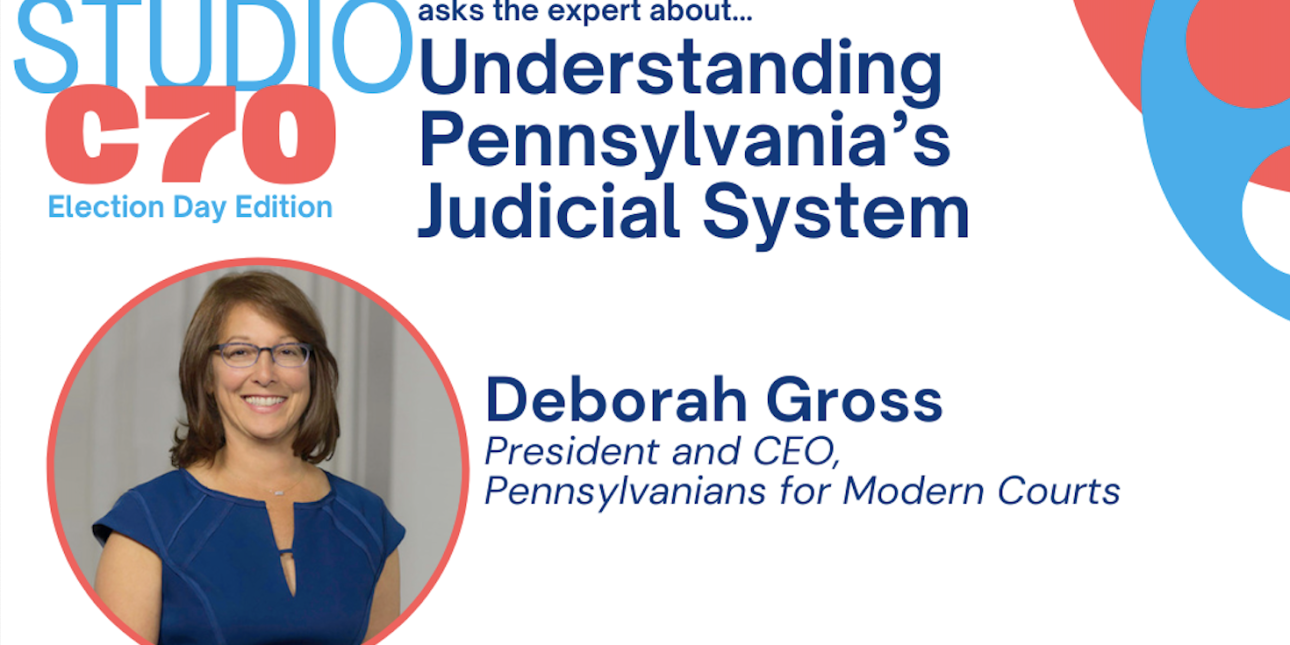Understanding Pennsylvania's Judicial System

StudioC70 Asks the Expert about PA’s Judicial System
Deborah Gross, President & CEO of Pennsylvanians for Modern Courts
Our recent conversation with Deborah Gross, President and CEO of Pennsylvanians for Modern Courts, highlights the importance of judicial elections, the case for merit selection of judges, and some of PMC’s efforts to increase public trust in the judiciary.
Pennsylvanians for Modern Courts (PMC) advocates for a number of judicial reforms, most notably the merit selection of appellate court judges and justices. PMC believes this approach, prioritizing qualifications over electability, would eliminate some of the dangerous influences caused by fundraising. Until then, PMC encourages voters to follow recommendations from the Pennsylvania Bar Association.
Daily Impact: While the U.S. Supreme Court receives more attention, it is the decisions of Pennsylvania's Supreme and Appellate Courts that have an immediate impact on residents' daily lives. These decisions address vital issues such as abortion, gun rights, family law, custody, voting redistricting, and education funding. PMC is dedicated to educating all Pennsylvanians about our state court system and providing guidance on navigating it with confidence.
Increasing Public Trust: Building trust in the judiciary requires active civic engagement. PMC's programming, like PMC Watches and Philadelphia Bail Watch, provides opportunities for people to observe court in action and aims to help demystify the court system by facilitating firsthand experiences. These efforts are complemented by PMC’s ongoing work to enhance civics education as a proud member of PA Civics.
In summary, our conversation showcases PMC’s oversight and advocacy work, and we are grateful to Deborah, and our PA Civics Coordinator, Sam Forman, for their engaging discussion.
Sam Forman: How do elections affect judicial composition in Pennsylvania?
Debbie Gross: Judges run on partisan ballots, so the composition could change based on the number of seats available. But I always like to say once the judge is elected, they serve for ten years; then they take off their partisan hat, and their allegiance is to the law. The reason I say that is, after ten years, they are reelected through retention elections. So when people will see “should this judge be retained” on their ballot, those are nonpartisan elections. They don't say what party that judge belongs to, because the whole purpose is to decide whether that judge should be retained based on his or her record, and how they performed as a judge.
Sam Forman: Should judges be elected or appointed?
Debbie Gross: We believe that appellate court judges should not be elected. Our appellate courts are comprised of our supreme, our superior, and our commonwealth courts. They represent the entire state. That's why we believe they should be appointed. If they run campaigns, they have to raise money…So it's a concern, right? Are you buying justice or are you going to get a fair shot at justice? The concern is that fundraising has some dangerous implications and influences, whereas if you select a judge, you could have more diversity on the court. You could have candidates who aren't as good at fundraising, but maybe have more qualifications.
Sam Forman: What is the impact of our court system on the lives of Pennsylvanians?
Debbie Gross: In Pennsylvania, our Supreme Court has handled cases that cover abortion, gun rights, family law, custody, voting redistricting, and a huge range of other issues. And while many people hear about the U.S. Supreme Court, the decisions from the U.S. Supreme Court don't actually have as great an impact on our lives as a decision from our Pennsylvania Supreme Court or any of our appellate courts. For example, our Commonwealth Court this past year issued a decision that said the way we fund education in Pennsylvania is unconstitutional. That's major. I mean, it is huge. It's saying to our legislature and our governor, you need to change the way we fund education. And that decision was not appealed to our Supreme Court, so it is the law of the land. So our appellate courts really issue decisions that are impactful.
Sam Forman: What can be done to increase public trust and confidence in the judiciary?
Debbie Gross: PMC taught a class in an alternative high school last year where the kids asked “Why should I sit on the jury? Why should I trust the judiciary? It's all rigged.” And I say to them, it's not rigged. Judges adhere to the rule of law, not to a party. I take kids into courtrooms to see hearings, to see trials, to see bail preliminary arraignments, so that they understand that this process is really unique, and we shouldn't take it for granted. So what we can do to instill faith in the judiciary is for people to come into court, sit in court, and observe. PMC does programming to facilitate this, including a bail watch, a preliminary arraignment watch, and an early bail review watch. This can be paired with increasing civics education, which we are working on as a member of the PA Civics Coalition.